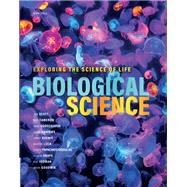Biological Science: Exploring the Science of Life responds to the key needs of lecturers and their students by placing a clear central narrative, carefully-structured active learning, and confidence with quantitative concepts and scientific enquiry central to its approach. Its straightforward narrative, reinforced by key concept overview videos for every chapter, communicate key ideas clearly: the right information is provided at the right time, and at the right depth.
Its pause and think features, self-check quizzes, and graded end of chapter questions, augmented by flashcards of key terms, directly support active learning. The combination of narrative text and learning features promote a rich, active learning experience: read, watch, and do. Its combination of Quantitative Toolkits, Scientific Process panels, and the Life and its Exploration chapters provide more insight and support than any other general biology text; they prepare students to engage with this quantitative and experimental discipline with confidence, and set them on a path for success throughout their future studies.
With coverage that spans the full scale of biological science - from molecule to ecosystem - and with an approach that fully supports flexible, self-paced learning, Biological Science: Exploring the Science of Life will set you on a path towards a deeper understanding of the key concepts in biology, and a greater appreciation of biology as a dynamic experimental science.








